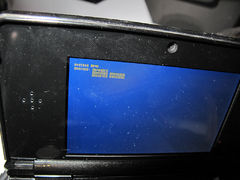Bootloader: Difference between revisions
Jump to navigation
Jump to search
m booting other FIRMs |
|||
| Line 56: | Line 56: | ||
... | ... | ||
== | == Boot procedure: == | ||
* 0 | * 0 seconds - unit is powered on. The ARM9 and ARM11 [[Memory_layout|bootroms]] begin execution. | ||
* 2 | * 2 seconds - ARM9 bootrom attempts to initialize the NAND. | ||
**If the NAND is successfully initialized, the ARM9 bootrom loads the [[FIRM|firmware]] stored in the NAND [[FIRM]] partition which handles booting the rest of the system (if verification for NAND firm0 fails, the ARM9 bootrom will attempt to use firm1 instead). The ARM11 kernel loaded from FIRM then launches the [[NCCH#CXI|CXI]] ARM11 system modules loaded from FIRM (i.e. sm, fs, pm, loader, and pxi). (Note that the ARM11 kernel does not handle any encryption/RSA verification, this is handled by the [[FIRM|ARM9]].) | |||
**If the NAND cannot be initialized (i.e. the NAND chip is not connected/damaged/etc), a blue error screen similar to the one above appears. | |||
* 3 | * 3 seconds - all essential hardware is active. The [[Process_Manager_Services|PM]] module launches [[NS]], [[NS]] then launches [[ErrDisp]] and the [[Configuration Memory#ACTIVEMENUTID|current active menu]] via PM module. For retail units, this menu is usually the [[Home Menu]]. NS will [[NS|auto-boot]] titles instead of launching ErrDisp/Home Menu, if auto-booting is needed. Note that the PM module first launches the module dependencies when launching a process, prior to actually launching the process. Further details on the Home Menu startup process can be found [[Home_Menu#Home_Menu_startup|here]]. | ||
* 4 | * 4 seconds - the LCD screens are initialized. | ||
* 7 | * 7 seconds - [[Home Menu]] is fully initialized/loaded. | ||
== BootROM == | == BootROM == | ||
The non-protected areas of the ARM9 and ARM11 bootROMs are identical, for launch-day regular Old3DS, 2DS, and regular New3DS. | The non-protected areas of the ARM9 and ARM11 bootROMs are identical, for launch-day regular Old3DS, 2DS, and regular New3DS. | ||
Besides NATIVE_FIRM, the bootloader is also capable to boot other firmwares (such as TWL_FIRM and AGB_FIRM). However, this will result either in a japanese Error-screen or a system shutdown, directly after FIRM-Launching. | Besides NATIVE_FIRM, the bootloader is also capable to boot other firmwares (such as TWL_FIRM and AGB_FIRM). However, this will result either in a japanese Error-screen or a system shutdown, directly after FIRM-Launching. | ||
Revision as of 13:09, 18 October 2015
When the 3DS does not find the NAND chip, the following error is displayed:
| Error | Description |
|---|---|
| 00F800FE 00000000 00000000 00000200 00000000 | Error when having SD-card reader connected to NAND during boot. |
| 00F800FE 00000000 00000000 00000400 00000000 | NAND not found error (?) |
| 00F800FE FFFFFFFF FFFFFFFF 00000080 00800000 | NAND error when DAT1 was used as DAT0. |
| 00F800FE FFFFFFFF FFFFFFFF 00000005 00800000 | NAND error when DAT2 was used as DAT0. |
| 00F800FE FFFFFFFF FFFFFFFF 00000005 00000000 | NAND error when DAT3 was used as DAT0. |
| 00F800FF F8F8FFFF FFFFFFFF 00000000 00000000 | Both the firm0 and firm1 partitions are corrupt (failed signature checks). |
| 00F800EE FFFFFFFF FFFFFFFF 00000000 00000000 | NCSD header in sector 0 is corrupt (failed signature check). |
NAND Reads
During a successful boot on 6.x, the bootloader (and firm) reads the following sectors from NAND (in this order):
00000000 (NCSD Partition Table) Only verify 'FIRM' magic? (A second Header-read will be attempted even if everything except the magic is 0xFF...) 0B130000 (FIRM Partition) 0B530000 (Secondary FIRM Partition) Verify RSA signature and parse Header: 0B130000 (FIRM: Header) 0B130200 (FIRM: Section 1) 0B163E00 (FIRM: Section 2) 0B193E00 (FIRM: Section 3) 00013000 .. Below is probably NATIVE_FIRM booting .. 00014000 00015000 00016000 00017000 09011A00 09011C00 09012000 09012400 ...
Boot procedure:
- 0 seconds - unit is powered on. The ARM9 and ARM11 bootroms begin execution.
- 2 seconds - ARM9 bootrom attempts to initialize the NAND.
- If the NAND is successfully initialized, the ARM9 bootrom loads the firmware stored in the NAND FIRM partition which handles booting the rest of the system (if verification for NAND firm0 fails, the ARM9 bootrom will attempt to use firm1 instead). The ARM11 kernel loaded from FIRM then launches the CXI ARM11 system modules loaded from FIRM (i.e. sm, fs, pm, loader, and pxi). (Note that the ARM11 kernel does not handle any encryption/RSA verification, this is handled by the ARM9.)
- If the NAND cannot be initialized (i.e. the NAND chip is not connected/damaged/etc), a blue error screen similar to the one above appears.
- 3 seconds - all essential hardware is active. The PM module launches NS, NS then launches ErrDisp and the current active menu via PM module. For retail units, this menu is usually the Home Menu. NS will auto-boot titles instead of launching ErrDisp/Home Menu, if auto-booting is needed. Note that the PM module first launches the module dependencies when launching a process, prior to actually launching the process. Further details on the Home Menu startup process can be found here.
- 4 seconds - the LCD screens are initialized.
- 7 seconds - Home Menu is fully initialized/loaded.
BootROM
The non-protected areas of the ARM9 and ARM11 bootROMs are identical, for launch-day regular Old3DS, 2DS, and regular New3DS. Besides NATIVE_FIRM, the bootloader is also capable to boot other firmwares (such as TWL_FIRM and AGB_FIRM). However, this will result either in a japanese Error-screen or a system shutdown, directly after FIRM-Launching.
